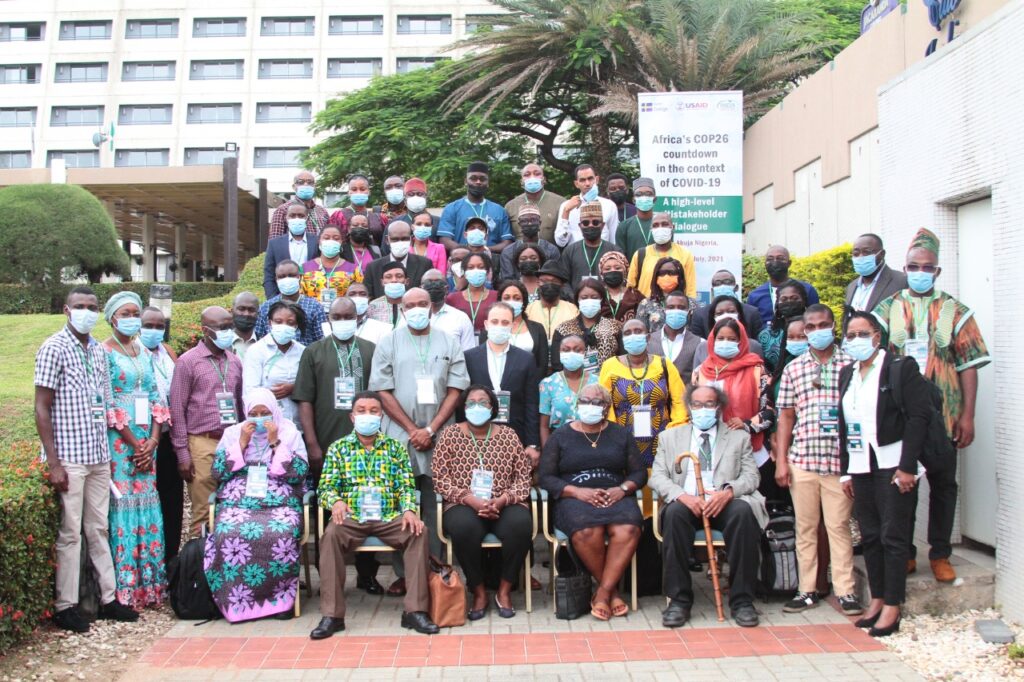
By Jiata Ekele
More than a hundred civil society representatives from across Africa gathered at the Road-to-COP26 Conference in Abuja, Nigeria, from 12- 18 July 2021 to develop a common position ahead of COP26, the climate change summit, billed for Glasgow, UK, later this year.
Organised by PACJA (Pan African Climate Justice Alliance) Secretariat in collaboration with, African Institute for Development Policy (AFIDEP), and the meeting which held at the Sheraton Abuja Hotel, Nigeria was hosted by Climate and Sustainable Development Network of Nigeria (CSDevNet). hosted the “Road to COP 26 Conference” at the Sheraton Abuja Hotel, Nigeria on 12th to 20th July, 2021.
More than a hundred civil society representatives from across Africa met in Abuja, Nigeria, to develop a common position ahead of COP26, the climate change summit, billed for Glasgow, UK, later this year. The meeting was held against the backdrop of little progress in international efforts to address the climate crisis, which has been made worse in the last few years by the COVID-19 pandemic.
Dr. Mithika Mwenda, the executive director of PACJA, in his opening remarks on Monday, said that Africa continues to be the epicentre of the climate crisis in terms of the devastations wrecking communities.
“From cyclones to drought; unpredictable rains to heatwaves; flash floods to desertification; African communities already experience life-changing effects of climate change on agriculture, water resources, livestock production and even spirituality. Some of these effects may already be irreversible”.
He noted that despite the decades of strong declarations and promises, the international community has yet to fully respond to the unique needs of African countries respond to the unique needs of African countries fully.
“We are in the situation we find ourselves in even though we contribute insignificantly to global warming. Africans have neither benefitted as others from the fruits of earth-warming industrialisation; nor can they protect themselves from the effects of looming climate meltdown. For us, the climate crisis is a crisis of numerous injustices to the people of Africa.”
At the end of the first two days of high-level discussions, the CSO representatives were able to press for a COP26 outcome that reflects the “special circumstances and needs of Africa” created by the injustices of climate change such as the disproportionate vulnerabilities and warming that its people face despite insignificant contribution to global warming.
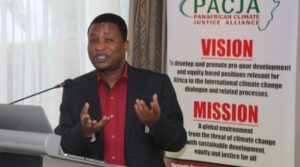
The conference also generated recommendations for a sustainable and low carbon pandemic recovery that addresses the full range of economic, social, health and environmental impacts sustained by the African people.
Several meetings and planned side events focused on a range of thematic issues, including energy, transitional justice, climate justice and reproductive health.
Several speakers on the first day during their opening remarks indicated their intentions to advocate for actions and financial flows that will in addition reduce emissions, and also create thriving and resilient communities in every corner of the African continent, however remote.
These speakers include: Harsen Nyambe- representative of the African Union Commission (AUC), Dr. James Murombedzi- representative of the African Climate Policy Centre UNECA, Wanjira Mathai- Vice president WRI, ; and Adesuwa Obasuyi- representative of the British High Commission.
Mrs. Asmau Jibril, Federal Ministry of Environment- Department of Climate Change (FME-DCC), who was well represented by Mrs. Chioma Amudi, the Desk Officer, gave focal points for NDCs implementation in Nigeria. She said that the NDCs were very ambitious and ready to be taken to COP26. Undertaking consultations, the NDCs partnership supported the process, especially in mobilizing finance.
“The intention of the government intends to be ambitious and not to repeat the previous mistakes it had made. It has expanded the sectors while capturing the interest of adaptation and gender. Vulnerability mapping was also included.
“Lessons learnt includes aligning climate action with economic recovery plan; enhancing gender responsiveness to further actions into subnational development; and developing the tool for mainstreaming the NDCs in the subnational and state agencies.
She also reinstated that towards the road map for NDC revision process, in as much as agents are doing a lot, there’s a need to build the national expert capacity to avoid depending on international experts, and also educating. As much as agents are doing a lot, there’s a need to build the national expert capacity to avoid depending on international experts and educate the humanitarians.
Some of the challenges faced by the department as highlighted by Chioma includes the restraints of not having physical meetings with relevant stakeholders; issues of virtual meetings and connectivity; timeline was also an issue due to Covid-19. Covid-19 also impacted the national economy.
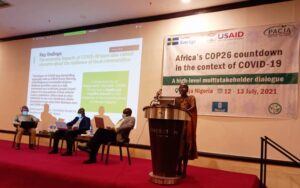
Dr. James Murombedzi- representative of the African Climate Policy Centre UNECA, gave a presentation on the state of affairs in Africa and global policy processes in the countdown to cop 26. He said that Africa is the most vulnerable to climate change with a high risk of climate change impacts unevenly distributed and differences in the level of vulnerabilities.
“Current state of climate change response is ineffective. There’s inadequate commitment in adaptation with an urgent need to increase mitigation responses and support there’s also need to raise more climate finance and technology transfer. There’s need to start specifying what is required to build resilience in the African economy. We have to start questioning the available climate finance infrastructure.
“We should be able to start contributing to innovative climate finances sources. Available natural resources are also required. The Article 6: on carbon market is the main source of finance for climate action so if properly regulated, the carbon market can play an important role. We need to also negotiate a climate finance figure on climate finance.”
The executive director of PACJA Dr. Mithika, asked a question about the ACPC and climate process in navigating the Africa'” ‘s Africa’s position/activities and how to link this conference/meeting with the upcoming CCDA meeting. Dr. James Morumbedzi replied, stating that there are several ongoing processes towards supporting African nations.
“CCDA is an initiative of AUC, AfDB in partnership with PACJA, and it will promote inter-African dialogues and Africa'” ‘s Africa’s position in COPs and climate change. CCDA will support policies under climate justice such as just transition. It will also discuss Africa'” ‘s Africa’s energy transition with multilateral efforts towards equitable and sustainable justice aiding in financing Africa and the NDCs.”
Richard Abubakar- a CRP (Community Resource Person) from CSDevNet asked how Nigeria, having discovered new deposit of gas, and the minister of environment will best handle local technologies to be replicated in exploit the resources using the local technology. Dr. James Morumbedzi like in the aforementioned manner, replied that carbon is an important issue.
“Our continent, Africa, has contributed the least impact on climate change because Africa has not invested on fossil fuels or carbon-intensive resources. There’s a clean link between fossil fuels and GDP but Africa cannot claim to develop using GDP. The agreement that we are pushing for is using natural gas into as a transitional fuel for development.”
Tracy Sony, one of the panelists for the discussion on the outcomes of the SBSTA Conference, spoke on key issues that came out of the UNFCCC meeting in Egypt. She stated that technical difficulties were experienced and that it was a bit difficult, especially on the differences in the time zones.
“A lot of issues were not finalized. A lot of informal notes to be discussed at COP26 for example: the issues of Adaptation and L&D were not discussed substantially. Finance was also missing across the agenda. Africa needs finance- 100 bn- no clear commitment on what developed countries have to submit so for now, we cannot quantify how much has been financed. The OECD indicates both loans and grants.
“In the G7 meeting, discussions were not clear. N—no clear outcomes, especially on climate finance. Finance for loss and damage were was not clear with no substantial discussions on L&D. We can tap within ourselves, especially when it comes to technology. We do have expertise, but because of how the finance is structured, it has become difficult. Transparency has also become another issue. Climate finance and Covid-19 situations leaves the African countries vulnerable.”
Nisreen Elsaim, part of the junior negotiators from Africa and also a lead coordinator for Agenda for Article 6 and 12, stated that as one of the agenda following technology transfer, they were only able to discuss one agenda items lead coordinator for Agenda for Article 6 and 12, stated that as one of the agenda following technology transfer, they could only discuss one agenda item.
“SBS are is required to develop agenda for COP26. No progress was made: the actual intention was to refresh the discussion. Developed countries wanted to have a decision to be discussed in COP. Although there was were no negotiating texts, there was were informal notes for the core facilitators at the end. The delay was not only in one section but three.
“The progress we are making at the negotiation is quite small little making it difficult as a result of Covid-19. There will be an impact in the next 10 to 15 years. Differences in time zones also made the virtual meeting difficult. The meeting was very beneficial to those who attended the African Hub. In regards to Article 6 negotiation, there was a high-level discussion from the article 6 on the 7th of July.”
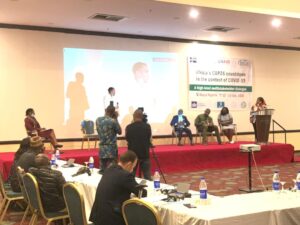
Nisreen said that the Milan Event for Youth in Africa is to be a bridge. There are a lot of opportunities for young people in the event. Africa will have the largest most significant number of youths. She has been mandated to open discussions on the main central issues and take them back to the secretary-general, especially on how COP26 should look like for the youths. Capacity building and knowledge exchange is key, and intergenerational experience exchange transferring knowledge to the youth is also crucial.
Augustine Njamnshi, Chair, Technical and Political Affairs- PACJA, gave a presentation on political issues shaping the discussions on COP. He said that this COP was peculiar because it’s it’s taking place amid Covid-19.
“If Covid-19 is the 100m race then climate change is a marathon we are still running. The global economy shut down on the verge of Covid-19 just to ensure that people were safe; if climate change impact is swift and was felt in the Global North like Covid-19, we would have to ensure that people were safe; if climate change impact is swift and was felt in the Global North like Covid-19, we would have the same response. But climate change is slow and insidious with ripple effects.
Afterwards, there was a panel discussion on the roles of youth and digital activism as it they relate to climate action. Panelists were Meryne Warah, Swaleh Elbusaidy, Richard Umar, Tito Uzodima, Jiata Ekele and Anicet Aboue; moderated by Nisreen Elsaim and Eugene Nforgwa. They all gave background presentations on PACJA’s YDA (Young Digital Activists) engagements so far.
In addition, Swaleh spoke on the climate plight of the land of Lamu in Kenya. He said that the impact of climate change affecting the people in that land were was economically, health-wise and social. They include more climate vulnerability, decline of fish, land degradation and shrinking livelihoods. He stated that CRPs (Community Resource Persons) were able to use a bottom-top approach in climate action. The grassroots do not know what policies were. In as much as policies were made, they have to be bottom-up. They also do advocacy as duties to empower communities, for instance, the coal plant communities.
Jiata and Richard went further to give explicit detailed presentations on the success stories of the YDAs/CRPs in Nigeria.
Dr. Ezekiel Lesmore, Director of Programs AACC, spoke on the role of the faith faith-based institutions in the COP negotiations: A presentation of the AACC position for COP26. He said that:
“Religious entity entities have erroneous perceptions about CSOs and vice versa. It is important essential for CSOs to identify religious leaders in their communities. They should be recognised as relevant stakeholders and be engaged by silent or quiet diplomacy rather than the usual open approaches. It is our responsibility to ensure that the religious leaders are brought on board.
Dr. Mithika Mwenda gave a presentation on just recovery giving providing insight on the new publication by PACJA. He mentioned that just recovery which considers climate change is fair, equitable, ecologically fair and inclusive. Dr. Mithika introduced the study that was conducted with other universities specifically, the rationale for the study: the initial prediction was that by 2030 will we have 5.3 million; some of our health systems collapsed when the pandemic started; there was also food insecurity with a vast collapse of businesses and jobs.
“The communities are at the frontline of climate impacts and have been affected. We need to use this evidence of this study so that when the government are putting priorities for Covid-19 recovery, climate change should be given equal priority. We still need to mitigate poverty and persuade policy makers.”
Afterwards, a detailed panel discussion on the study followed. The panelists comprised of the co-authors: physical and virtual.
There was also a six group, break-out discussion on in in-depth issues of CSOs demands for COP26. This answered specifically precisely the questions:
- What are the main issues that African CSOs should push for in COP26?
- Who are our main allies, and how can we push through our agenda?
Six groups were the six thematic areas.
Next The next day, looking at just transition, the moderator was Eugene Nforgwa. Augustine Njamnshi started the session by reiterated reiterating the need for Africans to speak up.
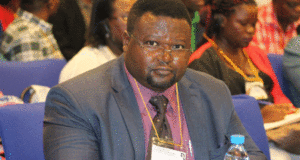
“We cannot be timid as to bringing up issues that are sometimes controversial and what people don’t want to hear. People have been under the effect of climate change, and when you look at the negotiations, there’s nothing to give us the impression that urgency/emergency is reflected or given prominence. Covid-19 has only exacerbated the already worsening situation of climate change impacts. Covid-19 has not come to replace climate change. When we look at the responses to Covid-19, especially from developing countries, we start to doubt whether the lack of interest and slow response to climate change is a lack of goodwill or a lack of resources.
“In recent times, communities from different nations have come together to address Covid-19 yet climate change, a devastating situation that we’re we’re already aware of, nothing much has been done about, and so it worsens. Even the little Covid-19 vaccines and health care available to us in the Global South shows that again, whenever anything concerns us the global south, the developed nations do not care enough about developing countries, Africans.
He added that, “As developing countries, CSOs have been asking and unless the developed countries deal with the issues in our objectives we cannot make any progress. Just Transition deals with the past and more together in solidarity. Transitional Justice has been proposed as a tool to build confidence and more move together forward in solidarity.
The top-down approach of the Kyoto protocol was changed to the bottom-top approach of the Paris Agreement. We need another approach like Just Transition. This is not a decision-making meeting but also a capacity-building program that teaches the Transitional Justice which provides ideas as to do no harm.”
During the session, participants pointed out that transitional Justice justice tends to be a slow process and that it requires institutional change; even with institutions, it tends to be a bit slower and so not very appropriate for emergencies. They also mentioned that there’s there’s a need to set up, in each country, a panel of experts to analyze what is happening in each country with regards to climate disasters and recommend the government on what measures are required.
They discussed the principles of just transition and transitional justice and that the two are used, merged. The participants also said that redress is a key issue even though it is common setting up a special court, the whole idea is to take what is useful and tailor it to the issue that needs to be addressed, and there’s there’s a need to approach other non-institutional measures, for example, truth, commissions, dialogues, etc. which might be more productive than seeking legal redress. On reconciliation, it is about solidarity, truth, creating national dialogue and a bottom-up approach.
The participants agreed that transitional justice could address climate change as a root cause for conflict and Climate Change also be used as a mechanism in climate justice. CSOs should be active in modeling participatory approaches to transitional justice involving grassroots communities.
Augustine mentioned that the African Union developed the Transitional Justice policy but failed to include issues of climate change probably because they didn’t see a connection between the two. He said that there’s there’s a need to connect the two: it is about advocacy and building awareness in terms of ensuring climate change is integrated into Transitional Justice issues.
Way forward and closing remarks during the group discussion session, Augustine Njamnshi said that:
“At Cape Verde next month, we will continue to push awareness on the issue of this topic: Just Transition and Transitional Justice. The AACC already took a position and are promoting it. CSOs have already taken it up and are promoting it also. If the communities we’re we’re advocating can have real natives to account for their experiences at COPs, it would be a welcoming idea.”
